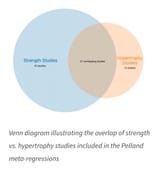Search Results
7/2/2025, 10:57:05 PM
>>76331177
>That studies(plural) are useless because you can support any argument for how to train with some study or another even though the circumstances of the trainees are completely different, to the point it's almost useless information,
That's why metastudies exists, to analyze all studies and find commonalities, see pic related, for example, for a recent metaregression.
>and a TON of studies are done on untrained subjects who literally grow just from touching a barbell.
If you do a study on beginners and the study show better result in a group than other, then it doesn't matter if the beginners grow with any training because it's still showing a difference.
>If you can't deduce why, from a scientific standpoint, as in the scientific method we were all taught in school, exercise studies that get thrown around on /fit/ all the time are nigh useless, then idk what to tell you.
The studies have limitations and using a single study to change your whole training is retarded, but that's not what I'm saying to do.
>If they could design a decent study between them, they might get a grant, instead they project personal definitions on vague shit like "failure" and expect everyone to believe beginners/early intermediates totally did an RPE0 set, bro.
RPE0 is easy, it's RIR 0 what you were trying to say.
Also, many studies go to failure when the lifter can't lift any more, going to failure isn't complicated to do, really.
>Yes, doing more means more results, typically, but you can't just blanket apply "more is more" when talking about, say, max effort compound lifts where you'll damage more tissue than you can recover doing high volume.
I agree with you here, and basically everyone else does, that's why nobody recommend to do as many sets as physically possible, but the point of overtraining is higher than what the low volume crowd says.
>>76331208
All the studies point toward more and harder work being better for gains so science isn't providing a shortcut.
>That studies(plural) are useless because you can support any argument for how to train with some study or another even though the circumstances of the trainees are completely different, to the point it's almost useless information,
That's why metastudies exists, to analyze all studies and find commonalities, see pic related, for example, for a recent metaregression.
>and a TON of studies are done on untrained subjects who literally grow just from touching a barbell.
If you do a study on beginners and the study show better result in a group than other, then it doesn't matter if the beginners grow with any training because it's still showing a difference.
>If you can't deduce why, from a scientific standpoint, as in the scientific method we were all taught in school, exercise studies that get thrown around on /fit/ all the time are nigh useless, then idk what to tell you.
The studies have limitations and using a single study to change your whole training is retarded, but that's not what I'm saying to do.
>If they could design a decent study between them, they might get a grant, instead they project personal definitions on vague shit like "failure" and expect everyone to believe beginners/early intermediates totally did an RPE0 set, bro.
RPE0 is easy, it's RIR 0 what you were trying to say.
Also, many studies go to failure when the lifter can't lift any more, going to failure isn't complicated to do, really.
>Yes, doing more means more results, typically, but you can't just blanket apply "more is more" when talking about, say, max effort compound lifts where you'll damage more tissue than you can recover doing high volume.
I agree with you here, and basically everyone else does, that's why nobody recommend to do as many sets as physically possible, but the point of overtraining is higher than what the low volume crowd says.
>>76331208
All the studies point toward more and harder work being better for gains so science isn't providing a shortcut.
Page 1
